- Bernard Preston homepage
- Honey Mead
- Rose Petal Honey Mead
Rose petal honey mead
Rose petal honey mead has the sublime fragrance of a million flowers. Alas you have to be a beekeeper and a serious gardener to brew it.
Brewing mead is the perfect hobby for a couple. One keeps the bees, not necessarily the man and the other grows the roses.
In fact many of the best beekeepers are women; and who says a man can't love growing roses?
If you enjoy reading then make sure that For Love of a Rose[8] by Antonia Ridge is one that you have under the belt; a beautiful book.
But if you have a lot of money to buy good honey and have access to dozens of rose bushes then you could be in the business of meading; one of most intriguing and interesting hobbies.
The basic ingredients are rose petals, natural honey and pure water; to which are added various astringents and other flavours of your own choice. Today I am using lemon pulp, black tea and a few peppadews.
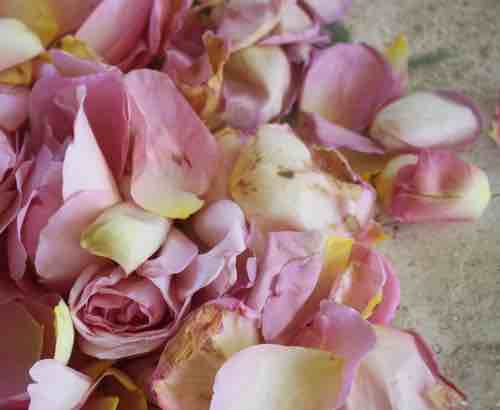
Ingredients
- Rose petals
- Honey
- Lemon
- Black tea
- Orange zest
- Chili
5L
- 500ml
- 1.7kg
- 0.5
- 1 tsp
- 1 orange
- 10g
8L
- 800ml
- 2.7kg
- 0.8
- 1.6
- 1.6
- 16g
18L
- 1.8L
- 6kg
- 1.8
- 3.6
- 3.6
- 36g
23L
- 2.3L
- 7.6
- 2.3
- 4.6
- 4.6
- 46g
Rose petals
Clip the rose heads as they are just starting to fade. If you do not have enough petals at one time, freeze the flowers until you have sufficient. Don’t worry if they go a little brown. Collect strongly-scented blooms of any and all colours.
That means giving preference to the old-fashioned roses that actually have a scent.
500ml of rose petals compress down into a half-litre container.
Honey
Use only the finest honey on hand[1]. There's no point going to all this work utilising that which you have purchased from the grocery store; it may be adulterated and almost certainly has been heated and filtered. You want as much pollen as possible, in part for yeast nutrition; but also to contribute to your own well-being[2].
Surprisingly considering that honey is mainly a mixture of glucose and fructose, when completely unprocessed it has a low glycaemic index[3]; it does not mess with your blood sugar. This of course is even more the case once brewed into a mead.
Ask your doctor to do a HbA1c test. In fact we should all have it done; diabetes is a monster and fully a half of its victims are wandering the streets undiagnosed. Luckily using food as medicine is can be brought completely into submission.
Lemon
Most recipes in the kitchen ask for lemon juice. Yet more than half of the important nutrients are found in the pulp so I advocate using both.
The South African guru, Eddy Lear's recipe uses the juice of 1 lemon in a 5L carboy or demijohn; I have recommended half a fruit but including the pulp too.
Did you know that beta-cryptoxanthin is the only proven nutrient that will help prevent dementia; eat citrus daily. Your Rose Petal Honey Mead will thus also help stave off that evil day too! More than half is found in the pulp.
Next time I will use limes instead of lemons; just for fun. Never get tied down by a recipe; cooking in the broadest sense of the term then becomes very boring.
Chili
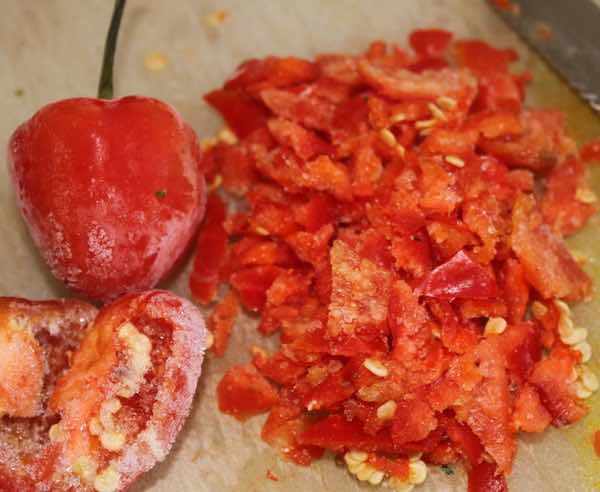
Generally the Sichuan pepper is recommended; it has a fruity flavour apparently.
I have substituted with peppadews from which the seeds have been removed; they grow in abundance in our green garden[4]. Right now, in spring they are out of season; so I have used frozen fruit.
So use 1 peppadew in 5L of the must. The amount is not critical, depending on your taste buds.
A peppadew mead would use about 20 of the fruit in a 23L carboy; it's not too spicy. So for the Rose Petal we are looking for just a hint of chili.
Orange zest
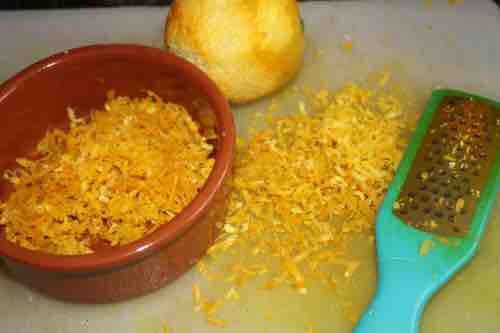
A planar is a very useful, inexpensive kitchen utensil. One orange will produce about 25g of zest.
As I'm sure you know many important nutrients like limonin are found in the zest. Most of them are unknown.
Water
Tap and even bottled water today are suspect, laced with plastic microparticles and many noxious chemicals that will affect the taste of your Rose Petal Honey Mead.
So I use only sterilized rainwater. You could boil it; I have a UV lamp.
Tea
I use only loose tea because of the plastic nano-particles from the bags. It tastes much better in any case.
Today I am using black rather than green or rooibos tea but you can experiment with your favourites.
Strain the tea into a pot; add the orange zest and the chili. Then boil for a couple minutes and allow to steep for another five.
Honeycomb
Yeast like humans cannot live on carbs alone. If you are using natural honey it may be enough but I add a small piece of comb with fresh pollen to be certain there are sufficient nutrients for the fermentation to go smoothly.
Yeast
Generally 1 sachet of dried wine yeast is recommended for 5L of must. Everything depends on the virility of your strain. Mine has bubbled over frequently so I now add far less; 1/2 tsp for a large carboy. You will have to experiment.
Bag and pebbles
A bag weighted down with smooth river pebbles will keep the solids submerged and together for easy removal. Remember that whilst aerating the must they could crack the glass; do it mindfully[7].
Make a bag roughly the diameter of the mouth of the carboy for easy removal; about 6 inches.
The comb is less dense than water; it will float. Plus bubbles of gas cling to the contents of the bag; add enough pebbles to keep it submerged.
Putting it all together
- Add the honey to the carboy.
- Add half the warm sterilized rainwater. The must should be at about 30oC.
- If you are using a large, heavy carboy the next step is best done by two people. Take the container in your arms and slosh the liquid about for a whole ten minutes; aerating the must[7] is important to get the fermentation off to a quick start. It also helps dissolve the honey.
- Place the rose petals, solids and pebbles into the bag. Set it gentry into the carboy.
- Pour the tea into the bag so the zest and chili are captured; tie a loose knot.
- Now fill the carboy with the remaining sterilised rainwater to about 7cm from the top. Leave a good space to stop a strong fermentation overflowing and making a dreadful mess. Once the bubbling has steadied you can top it up with more honey solution.
- Using a wine-thief draw enough of the must to fill a measuring cylinder. Check the pH and specific gravity; taste the mother liquor.
- Hydrate the yeast by sprinkling 1/2 tsp into half a cup of warm water. After 20 minutes give a good stir and pour the liquid onto the must.
- Fit the air trap; fermentation should begin within 24 hours.
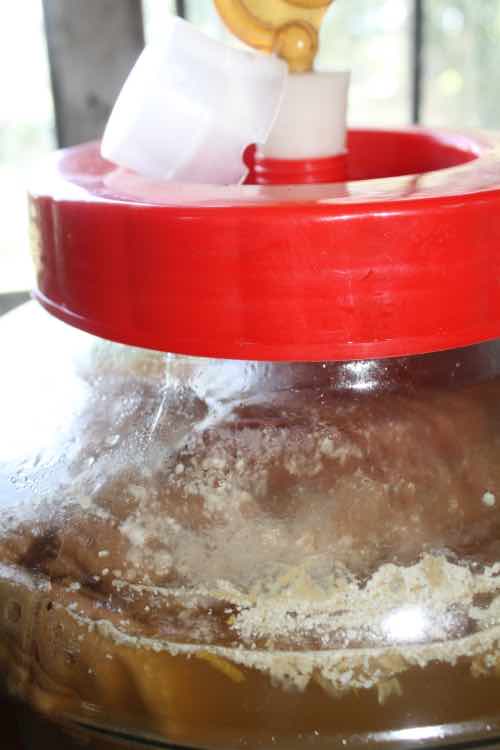 Notice the bag is floating out of the mother liquor; more pebbles are needed.
Notice the bag is floating out of the mother liquor; more pebbles are needed.Notice that I am using a conventional air-lock; water tends to evaporate very quickly from the moat in the lid. If you are not particularly vigilant, it dries out; fruit flies and oxygen may get into the carboy.
So I never use that plastic cap shown any longer.
3 months later
- Syphon off the mead into smaller demijohns leaving as much of the sediment behind as possible. Store in a cool, dark place; or cover the bottles with a heavy cloth.
- Draw off a small amount of the mead; test the pH and SG. If necessary add bicarb slowly to get the acidity to between 3.5 and 4.5; it will bubble and froth vigorously and may foam over.
- It's best to again fit an airlock as fermentation can go on for months; in a tightly sealed demijohn you could have a dangerous explosion.
- About six months later you can bottle if the sediment has settled at the bottom and the mead has cleared; a second racking is never amiss.
Add 1.25ml of sodium bicarbonate per 0.5 adjustment on 5 litres.
To raise the pH from 2.0 to 3.5 one would need 3 x 1.25ml = 3.75; about half a teaspoon.
Maturing
Your Rose Petal Honey Mead will definitely improve with time. Ideally you should wait a year or more before drinking it. Obviously this won't happen with your first brew but try to keep one demijohn back for the future; label it carefully.
So I strongly recommend a second carboy so that you can start another brew if you plan to take up meading seriously; either immediately or as soon as you have more honey available.
I have just tasted the mead at 6 weeks; it's supremely good, if a little rough.
Gleanings
Dealing with the gleanings is always a problem. You don't want to heat the cappings and ruin the honey. It is also not advisable to put them out as they may spread disease and cause a bee war.
I now get most of my honey for meading from the cappings; simply add some warm water, slosh it about and filter. There are often bee parts and other foreign bodies that should not go into the must.
Pour that filtered solution into the bag containing the petals, fruit and river stones. There's no problem if a little wax gets through. This also provides plenty of pollen, the nutrient for the yeast.
As a rule of thumb 1kg of cappings contains about 350 grams of honey; depending on how long it has dripped and whether you used a hot knife, fork or roller.
Rose petal honey mead
Rose petal honey mead adds a little mystery to what is already an astonishingly good and even nutritious aperitif; unlike commercial wines it is unpasteurised. No sulphur dioxide is used.
There is disturbing research, confirmed many times over that even small amounts of commercial alcohol will increase the risk of malignant tumours, particularly of the breast[5]. Yet the folk in the Blue Zones enjoy natural unpasteurised wines daily with their meals; and still have very long and zestful lives.
It's not implausible that it is the toxic ecocides used to spray the grapes that are the villain of the piece; and not the alcohol.
This Rose Petal Honey Mead is a natural wine that acts as a probiotic, providing yeast cells for the friendly flora in the gut; in moderation it's actually healthy. Obviously any alcohol that assumes the role of master of the house, rather than the serf becomes a monster.
Roses in the home garden are not usually sprayed with insecticides.
Patience
And now time has to pass; many of the best things in life cannot be rushed. A good deal of patience is required. It will be at least six months before I can publish a photograph of my first glass of Rose Petal Honey Mead.
If you are an eager-beaver and have plenty of honey available then when in season experiment with other fruit; technically it is then known as a melomel rather than a mead.
This cherry guava honey mead is my favourite, though the peppadew is a close rival. Natural wines and beers contribute to the health of the gut; in moderation. For one person to enjoy say 2 bottles per week, 1.5 litres you would need to brew about five large carboys every year.
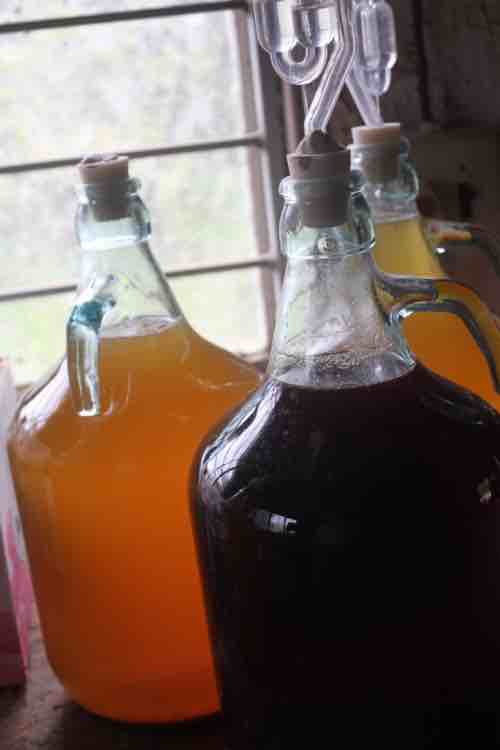 Peppadew and cherry guava meads
Peppadew and cherry guava meadsWhen browsing use right click and "Open Link in New Tab" or you may get a bad gateway signal.
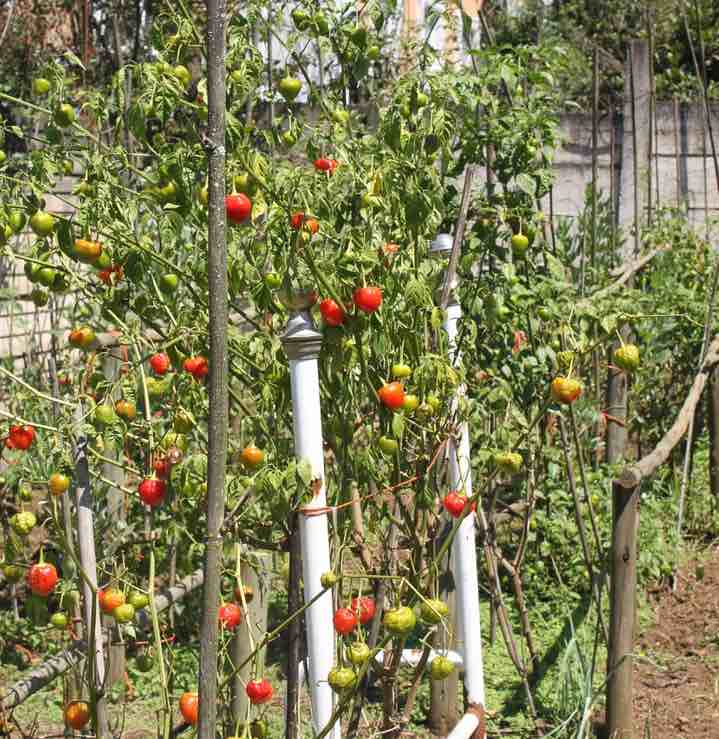 Peppadews are easy to grow but they need to be supported
Peppadews are easy to grow but they need to be supportedThe synergy of green living
There's a synergy of green living. Growing your own vegetables and keeping bees will lead onto many other hobbies and delights; like this rose petal honey mead. Getting away from food covered with pesticides, escaping from the sugar addiction and not having to sign up for a gym contract will all contribute to your wellness.
- Excessive sugar drives dementia and stroke; words of wisdom from senior scientists leading the German Neurological Association.
"There is increasing evidence that exposure to plants and green space, and particularly to gardening, is beneficial to mental and physical health."
- Clinical Medicine (PMC6334070)
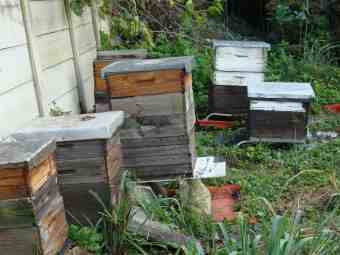
The healthy gut and malignant tumour treatment
"What we found was quite astounding. Namely, if our patients had a more diverse microbiome, they were more likely to respond to malignant tumour treatment; it is generally associated with better overall gut health, if you will."
- Dr Jennifer Wargo, MD
Dementia
Excessive sugar meaning more than 10 tsp per day drives dementia and stroke according to German scientists; alcohol and honey come into the equation too.
Yet the research was done with commercial alcohol and honey.
I cite the Greek island of Icaria which is one of the five iconic Blue Zone countries; ten times as many people live into vigorous old age without losing their marbles. Beekeeping and mead are central to their civilization.
It is my contention that unpasteurised mead without preservatives and natural honey probably escape the censure of those professors from the German Society of Neurology; but I could be wrong. Follow your own instincts.
Newsletter
Our newsletter is entitled "create a cyan zone" at your home, preserving both yourself and Mother Earth for future generations; and the family too, of course. We promise not to spam you with daily emails promoting various products. You may get an occasional nudge to buy one of my books.
Here are the back issues.
- Lifestyle and ideal body weight
- What are ultra-processed foods?
- Investing in long-term health
- Diseases from plastic exposure
- Intensive lifestyle management for obesity has limited value
- A world largely devoid of Parkinson's Disease
- The impact of friendly bacteria in the tum on the prevention of cancer
- There's a hole in the bucket
- Everyone is talking about weight loss drugs
- Pull the sweet tooth
- If you suffer from heartburn plant a susu
- Refined maize meal and stunting
- Should agriculture and industry get priority for water and electricity?
- Nature is calling
- Mill your own flour
- Bake your own sourdough bread
- Microplastics from our water
- Alternative types of water storage
- Wear your clothes out
- Comfort foods
- Create a bee-friendly environment
- Go to bed slightly hungry
- Keep bees
- Blue zone folk are religious
- Reduce plastic waste
- Family is important
- What can go in compost?
- Grow broad beans for longevity
- Harvest and store sunshine
- Blue zone exercise
- Harvest and store your rainwater
- Create a cyan zone at your home
Did you find this page interesting? How about forwarding it to a friendly book or food junkie? Better still, a social media tick would help.
- Bernard Preston homepage
- Honey Mead
- Rose Petal Honey Mead
Address:
56 Groenekloof Rd,
Hilton, KZN
South Africa
Website:
https://www.bernard-preston.com